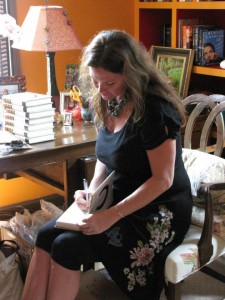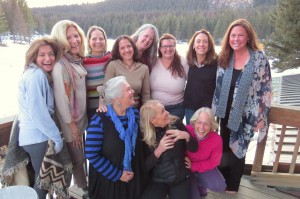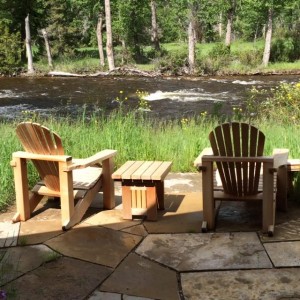Previously published by Adam Wahlburg from Think Piece Press. I have written my way through crisis many times in my life. One of those times resulted in a best-selling book that was published in nine countries. Most of the other stuff is in my journals. I believe that writing is a deeply healing tool. I …
 Previously published by Adam Wahlburg from Think Piece Press.
Previously published by Adam Wahlburg from Think Piece Press.
I have written my way through crisis many times in my life. One of those times resulted in a best-selling book that was published in nine countries. Most of the other stuff is in my journals. I believe that writing is a deeply healing tool. I recently had a conversation with a book editor who specializes in books written about crisis and healing. I’d like to share it with you because he asked really great questions and got my brain digging deep.
If you are considering writing your way though a crisis in your life, not just for your journals, here are some things to consider:
TP: The book is so skillful about identifying what’s really going on underneath the words, which is so hard to do. How did you arrive at such insights?
LM: Years of therapy! (Laughs.) Seriously. It also came from dealing with years of rejection from publishers and editors. When you get a form letter from the publishing world, it often reads like this: “This does not meet our needs at this time.” Right? It’s just the life of the writer. But I would take that personally. In two seconds you can take that form rejection letter to, I’m a bad writer, I have no talent, I’m never going to get published, I can’t believe she got published and I didn’t. All that junk. And all that does is bring one into an intense world of suffering, and I had gotten very tired of that suffering. I had to tell myself a new story. And with the help of a great therapist I learned to find a gap between the things that people say and do and my emotional reaction to it. Whether it’s a publisher or a husband! We have choices emotionally, and that is new news to a lot of people. It was to me. We don’t have to be emotional victims.
TP: You write so clearly about being aware of your negative self-talk, which is a battle in and of itself, for so many of us.
LM: It is. We all have one of those negative voices and he or she is loud. By the time you become middle-aged, the voice is usually saying really mean things, things you wouldn’t say to your worst enemy. Many of us aren’t even aware of the way we speak to ourselves in our own mind. When you start tuning in, it really helps you to understand how much of a corrosive climate we have in our own minds. We walk around saying such cruel things to ourselves and it becomes our normal. Finding the awareness of what goes on in our minds and seeing how we’re suffering and putting a stop to it is the practice. It’s not going to happen overnight. We have to be able to develop a payoff.
TP: What do you mean by that?
LM: Well, you’re not going to spend your whole life walking around saying, Oh I love myself! My life is great! That would be dandy, but for most of us that’s just not going to happen. When we can start accepting our whole selves including our shadow selves with our inner critic, and realize that the shadow self is a scared creature who lives inside of us, it gets easier to look for where the positive payoff is and to cultivate that. Once we start moving into that way of thinking it can inform our way of being.
TP: And writing for you is a part of that payoff?
LM: An essential part. And I think it can be for many people. I think writing should be considered as much a preventative wellness action as diet and exercise.
TP: I like that. When did you discover this for yourself?
LM: Pretty early. I was able to find it as a young woman, and that’s something I’m very grateful for. Writing wasn’t just a passion, it was a lifeline. It was the one place where the climate was a free zone, a place where I could always fit in, a place for my inconvenient truths and dirty secrets. That was the one place I knew I could go whenever I wanted and have it feel safe. Little by little it felt better and better to be in that place.
TP: What a gift.
LM: I’d spend hours and hours on a summer Saturday afternoon up in a treehouse writing and writing and writing. You’re just not born this way. At some point I figured out it feels good. It’s like people who are good at exercising and learn that it feels good to do it, so they go out for a jog. I never got that. (Laughs.) Writing is one thing I’ve been able to show up for in my life no matter what, whether I had three jobs or small children or was going through some sort of a crisis. I’ve always been able to tap into my writing.
TP: How does it feel to have a book take off in the way this one did, after so many years of writing?

TP: How did you keep the faith with writing all those years, finding time to do it while holding jobs and raising children?
LM: You may not know at first why you’re doing it. It took me a long time before I sat down and wrote an author’s statement because at one point after a number of brutal rejections from books that I felt were really quite publishable I just sat myself down and said why? When I realized that this might not happen, this publishing dream of mine, I had to accept that I’m not going to stop because this is my practice, my meditation, my way of life, my way to life. So I wrote down one line that came out of my deepest well, and it said, “I write to shine a light on a dim or otherwise pitch-black corner to provide relief for myself and others.” And that’s when I realized I was writing from a place of service, both to myself and others, and that’s when I started getting published.
TP: And through your Haven writing retreats, you’re helping others integrate writing into their lives. How did you get started doing them?

TP: And it’s growing and growing.
LM: It is. I’ve now worked with over 300 people. Open Road Media named Haven Retreats as one of the top five writing retreats in the country. I lead eight of them a year and we have an ongoing community of writers who continue to support one another. It’s not just a one-time deal. It’s a whole community of support and it’s designed based on what was lacking in my life. Community. Support. Kindred spirits. Mentorship. You can come to Haven I and experience the five day immersion into your writing voice and your stories and themes. Then you can come to Haven II if you are a Haven I alum and have a book in progress. And then if you complete the Haven II program, you are eligible to work with me one-on-one on your book. Not everyone who comes to Haven I is working on a book. So you can come to Haven I and have a complete and powerful experience, or work the whole program from inception to book birth, if that is your goal. Basically, I designed the retreat that I would want to go on, and the program I wish I’d had all along. It’s incredible to see all these Haven alums interacting on our private Haven internet page. So much support and kindness. It blows me away.
TP: You must meet so many interesting people.
LM: I do, and many don’t even consider themselves writers at all. They’re all over the place in their creative journey and I love that. We get people who have strong writing practices, publication credits, and we get people with works in progress, and we get people who are just starting and want to write in their journal or capture their grandmother’s homesteading story. I love that. We learn so much just by listening to each other and learning how each person’s voice is exceptional.
TP: Why is community so important?
LM: Just so you can be supported in your process. You can go to a cabin in the woods somewhere and be taken care of for food and things. Even if it’s just a small community that has meals together at the end of the day, I think that’s important. But a lot of people wouldn’t know what to do with the cabin in the words. The retreat is actually a retreat and a workshop in one. Each day you get major craft instruction through the morning class, which consists of writing prompts that I put together. But it’s very much through the back door. It’s play. We get outside of our comfort zone and people find their unique voice. And the evening class is a straight-up workshop, where writers get feedback for their work. You can consider the work that you do in the morning class compost at the end of the class.
TP: And it’s all done in a nurturing environment.
LM: It’s so important to have some kind of community, and to make sure that the people in that community know how to give good feedback. That’s rare, too, to find good readers. I’m trying to offer all of these things to people as I don’t want to perpetuate this tortured-artist paradigm. I want to empower people in their creative self-expression, wherever they are, and I know that’s possible. It doesn’t need to be a tortured way of life. And yet it’s a very rare person that wants to have writing in their life to this degree. I don’t want people walking around feeling alone and different and almost ashamed of that side of them. Haven sets you up emotionally and psychologically, whatever that means to you.
TP: You’re making me want to come to Montana.
LM: You have to come! I’m thrilled to share my Montana muse with other people. These people who come are really brave and a little scared but they’re taking a stand for their creative self-expression and it’s inspiring. Somehow they’ve gotten themselves out here to the woods of Montana to do this for five days and it’s wonderful.
TP: So do you still have time to write your own books? What’s next for you?
LM: I write several books at the same time and then I pick one to focus on. I just finished a memoir recently, and I finished a novel last winter that I have high hopes for. I’m also working on a book about the writing life and how to use writing in your life, much in the way that I’m talking about it with you. Oh, and a series of novellas. We’ll see which one gets fully birthed first. But ultimately if none of them gets published, I still feel complete. Writing is how I feel OK on this planet.
— This interview has been condensed and edited for publication.



